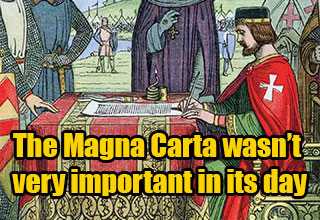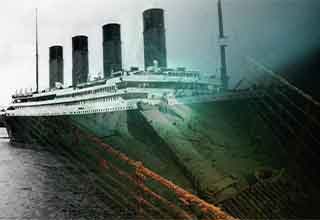19 Scholars Share the Most Common Misconceptions People Have About History
Carly Tennes
Published
07/03/2024
in
wow
Despite books, movies, and the insistence of your third-grade social studies teacher, there's a whole lot about history that we get wrong. Benjamin Franklin and his kite did not, in fact, invent electricity. German tanks during World War II were genuinely kinda mid -- even though they did look cool. George Washington did not chop down a cherry tree, no matter what that cheeky painting depicts. But these three tidbits are just the tip of the iceberg — just ask the history buffs stuck rebuking these points day after day.
From whether or not the burning of the Library of Alexandria was an arson job (it probably wasn't) to the truth about the Magna Carta, 20 history enthusiasts share the most common misconceptions people have about history.
- List View
- Player View
- Grid View
Advertisement
-
1.
 “The perception in the 1800s that Napoleon was short. He was actually average height, possibly slightly taller. The British media at the time helped spread the misconception about his height but some also say it was due to his company. He was commonly around his imperial guard which had height restrictions so he may have looked short in comparison…”
“The perception in the 1800s that Napoleon was short. He was actually average height, possibly slightly taller. The British media at the time helped spread the misconception about his height but some also say it was due to his company. He was commonly around his imperial guard which had height restrictions so he may have looked short in comparison…” -
2.
 “Hitler ‘fixed’ the German economy. He didn't. In fact, the … regime was very economic ineffective also the Weimar Republic actually recovered well from the 1923 hyperinflation and Germany's economy was growing strong before the [economic downturn of the late ‘20s and ‘30s].”
“Hitler ‘fixed’ the German economy. He didn't. In fact, the … regime was very economic ineffective also the Weimar Republic actually recovered well from the 1923 hyperinflation and Germany's economy was growing strong before the [economic downturn of the late ‘20s and ‘30s].” -
3.
 “That Marie Antoinette said ‘let them eat cake’. There is no record of her saying it, while numerous royals were accused or believed to have said the same thing throughout the 18th century”
“That Marie Antoinette said ‘let them eat cake’. There is no record of her saying it, while numerous royals were accused or believed to have said the same thing throughout the 18th century” -
4.
 “People in the Middle Ages (sometime also before) considered water unsafe and preferred wine or beer to prevent illness. This is not true, as water was the most common drink available, and access to potable water (running, pulled from a well or provided by an aqueduct, as 13th-century Tyburn circuit) was a major consideration in location of settlements and fortifications.Many medieval monastic regulations advocated drinking water, especially on fasting days. Beer and ale were common because it not only tastier than water, but also nutritious, while wine was considered a delicacy and drunk for its taste (and intoxicating effect).”
“People in the Middle Ages (sometime also before) considered water unsafe and preferred wine or beer to prevent illness. This is not true, as water was the most common drink available, and access to potable water (running, pulled from a well or provided by an aqueduct, as 13th-century Tyburn circuit) was a major consideration in location of settlements and fortifications.Many medieval monastic regulations advocated drinking water, especially on fasting days. Beer and ale were common because it not only tastier than water, but also nutritious, while wine was considered a delicacy and drunk for its taste (and intoxicating effect).” -
5.
 “Middle Ages were the period of decline or stagnation of the scientific, technical and social development that ended in Renaissance. In reality, almost whole medieval period witnessed not only formation of the local societies that rose to power after the fall of Western Roman Empire, but also the development of the whole northeastern Europe that was never in the borders of Roman Empire.”
“Middle Ages were the period of decline or stagnation of the scientific, technical and social development that ended in Renaissance. In reality, almost whole medieval period witnessed not only formation of the local societies that rose to power after the fall of Western Roman Empire, but also the development of the whole northeastern Europe that was never in the borders of Roman Empire.” -
6.
 “That the German tanks in WW2 were superior to everything the Allies had to offer, and that the Allies had to use their numerical advantage. Panther and Tiger look cool, yes, but they were actually a waste of resources.”
“That the German tanks in WW2 were superior to everything the Allies had to offer, and that the Allies had to use their numerical advantage. Panther and Tiger look cool, yes, but they were actually a waste of resources.” -
7.
 “Library of Alexandria was destroyed deliberately and it was an important event. In fact, the only historically attested destruction of library's contents (texts) was caused by Romans during military actions against Alexandria. Accounts of the destruction of Museion and Serapeion (buildings used for text storage and education) come from the times when position of Library of Alexandria dwindled from the centre of classical education to a provincial school, thanks to proliferation of schools and libraries in the Empire.”
“Library of Alexandria was destroyed deliberately and it was an important event. In fact, the only historically attested destruction of library's contents (texts) was caused by Romans during military actions against Alexandria. Accounts of the destruction of Museion and Serapeion (buildings used for text storage and education) come from the times when position of Library of Alexandria dwindled from the centre of classical education to a provincial school, thanks to proliferation of schools and libraries in the Empire.” -
8.
 “Crossbows were considered to be weapons so dangerous (as any commoner could have easily killed a knight) so that their use was banned by the Church. In reality there is not a single ecclesiastical document that would single out crossbows as a 'banned' weapon.”
“Crossbows were considered to be weapons so dangerous (as any commoner could have easily killed a knight) so that their use was banned by the Church. In reality there is not a single ecclesiastical document that would single out crossbows as a 'banned' weapon.” -
9.
 “Napoleon lost the Russian campaign because of winter he wasn't prepared for. This one is tricky, as it is only partially true. Napoleon did not prepare for winter because he never though the hostilities would last that long and he achieved all his strategic goals, invading Russia, dispersing Russian army and capturing Smolensk and Moscow but then and essentially allowed himself to get surrounded and cut of from supplies. Also, the Grand Army left the Russian territory in mid-December meaning that, technically, Russian campaign has never been fought in winter (not that it mattered, with autumn temperatures falling to -30 degrees Celsius).”
“Napoleon lost the Russian campaign because of winter he wasn't prepared for. This one is tricky, as it is only partially true. Napoleon did not prepare for winter because he never though the hostilities would last that long and he achieved all his strategic goals, invading Russia, dispersing Russian army and capturing Smolensk and Moscow but then and essentially allowed himself to get surrounded and cut of from supplies. Also, the Grand Army left the Russian territory in mid-December meaning that, technically, Russian campaign has never been fought in winter (not that it mattered, with autumn temperatures falling to -30 degrees Celsius).” -
10.
 “Most Americans celebrate Christopher Columbus as the person who discovered America, yet Vikings came to North American shores hundreds of years before he did. Not to mention that he should not be celebrated at all, he slaughtered thousands of native Americans and/or was directly responsible for thousands of deaths.”
“Most Americans celebrate Christopher Columbus as the person who discovered America, yet Vikings came to North American shores hundreds of years before he did. Not to mention that he should not be celebrated at all, he slaughtered thousands of native Americans and/or was directly responsible for thousands of deaths.” -
11.
 “I’d call it a tie for gaslighting more than misconception but luddites and rednecks were not backwards people, they were labor movements, and ‘entitled’ did not mean ’spoiled’… The Luddites were a labor movement in the textile industry protesting unsafe working conditions and unfair wages/employment risks often done by skilled equipment operators who were willing to sabotage the factory equipment as a way of sticking it to the company. Similarly, rednecks were a group/union of miners--not just white people either, it included black and immigrants too--who stood up to the monopolistic grip on the Appalachian region of a mining company and fought a private mercenary army of about 2000 people, and even got bombed by planes during a major battle.”
“I’d call it a tie for gaslighting more than misconception but luddites and rednecks were not backwards people, they were labor movements, and ‘entitled’ did not mean ’spoiled’… The Luddites were a labor movement in the textile industry protesting unsafe working conditions and unfair wages/employment risks often done by skilled equipment operators who were willing to sabotage the factory equipment as a way of sticking it to the company. Similarly, rednecks were a group/union of miners--not just white people either, it included black and immigrants too--who stood up to the monopolistic grip on the Appalachian region of a mining company and fought a private mercenary army of about 2000 people, and even got bombed by planes during a major battle.” -
12.
 “People think because the average life span was between 30-40 years that everyone died in their 30’s, but that is more because the infant mortality rate was so high. If you lived past the age of 5 you were likely to have a normal life span compared to today.”
“People think because the average life span was between 30-40 years that everyone died in their 30’s, but that is more because the infant mortality rate was so high. If you lived past the age of 5 you were likely to have a normal life span compared to today.” -
13.
 “That Rome and Ancient Greece were full of cities of white marble. Both societies (and in fact, most ancient Mediterranean ones) painted the h—l out of everything, including statues.”
“That Rome and Ancient Greece were full of cities of white marble. Both societies (and in fact, most ancient Mediterranean ones) painted the h—l out of everything, including statues.” -
14.
 “That the US Civil War was fought over states rights. Or the right to own slaves. It was fought over slavery. The confederates said so. Put it in writing. They were proud of doing god’s work. States rights is one of the excuses the k—n taught and got added to school curriculum. The confederates didn’t believe in states rights.”
“That the US Civil War was fought over states rights. Or the right to own slaves. It was fought over slavery. The confederates said so. Put it in writing. They were proud of doing god’s work. States rights is one of the excuses the k—n taught and got added to school curriculum. The confederates didn’t believe in states rights.” -
15.
 “George Washington never cut down a cherry tree, it was a story from Mason Weems that he wrote in a book after Washington’s death to profit off of his namesake.”
“George Washington never cut down a cherry tree, it was a story from Mason Weems that he wrote in a book after Washington’s death to profit off of his namesake.” -
16.
 “Benjamin Franklin did not "invent" electricity, he simply expanded on what was currently known about it.”
“Benjamin Franklin did not "invent" electricity, he simply expanded on what was currently known about it.” -
17.
 “The reason people didn’t smile in old photos is because early photography was inspired by painting, where smiling was seen as inappropriate while stern looks appeared more formal for portraits.”
“The reason people didn’t smile in old photos is because early photography was inspired by painting, where smiling was seen as inappropriate while stern looks appeared more formal for portraits.” -
18.
 “I was a history major (mostly US history). I always had the impression that Magna Carta was this shining beacon of human rights which came down from the heavens and placed immediate limits on royal power, but that really wasn't the case. The Pope nullified it, and no one even paid attention to it until after King John's death. It did not become known as the iconic charter it is today until centuries later.”
“I was a history major (mostly US history). I always had the impression that Magna Carta was this shining beacon of human rights which came down from the heavens and placed immediate limits on royal power, but that really wasn't the case. The Pope nullified it, and no one even paid attention to it until after King John's death. It did not become known as the iconic charter it is today until centuries later.” -
19.
 “Nero's reputation of indifference to the people ('fiddling while Rome burned'). He was actually 30 miles away when it happened, the fiddle (and lyre, the instrument originally associated with this story) didn't exist in Rome at the time, and when he found out about the fire he immediately rushed back and personally led rescue efforts. He was also very popular among the lower classes. He did enact some pretty sweeping building/urban planning rules, including building a giant pleasure palace for himself over the burned ruins, after the fire … He's just a guy who liked to party who was unlucky enough to be in charge during a catastrophe, and whose enemies wrote his story.
“Nero's reputation of indifference to the people ('fiddling while Rome burned'). He was actually 30 miles away when it happened, the fiddle (and lyre, the instrument originally associated with this story) didn't exist in Rome at the time, and when he found out about the fire he immediately rushed back and personally led rescue efforts. He was also very popular among the lower classes. He did enact some pretty sweeping building/urban planning rules, including building a giant pleasure palace for himself over the burned ruins, after the fire … He's just a guy who liked to party who was unlucky enough to be in charge during a catastrophe, and whose enemies wrote his story. -
20.
 “Cleopatra wasn’t all that beautiful. She’s described... harshly and depicted that way as well until modern times. She was also the most powerful person in one of the most powerful kingdoms in the world. She spoke just about every language she came into contact with. She was a master stateswoman and diplomat. She managed to produce (illegitimate) heirs to two separate leaders of the most powerful empire on the planet. Cleopatra is always depicted for her beauty, but the reality is that she was a genius who managed to manipulate the world around her through cunning and intelligence.”
“Cleopatra wasn’t all that beautiful. She’s described... harshly and depicted that way as well until modern times. She was also the most powerful person in one of the most powerful kingdoms in the world. She spoke just about every language she came into contact with. She was a master stateswoman and diplomat. She managed to produce (illegitimate) heirs to two separate leaders of the most powerful empire on the planet. Cleopatra is always depicted for her beauty, but the reality is that she was a genius who managed to manipulate the world around her through cunning and intelligence.”
- REPLAY GALLERY
-

- 19 Scholars Share the Most Common Misconceptions People Have About History
- NEXT GALLERY
-

- 37 Fun Facts to Cram Inside Your Thinking Cap
“The perception in the 1800s that Napoleon was short. He was actually average height, possibly slightly taller. The British media at the time helped spread the misconception about his height but some also say it was due to his company. He was commonly around his imperial guard which had height restrictions so he may have looked short in comparison…”
20/20
1/20








6 Comments